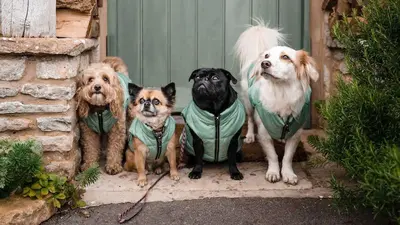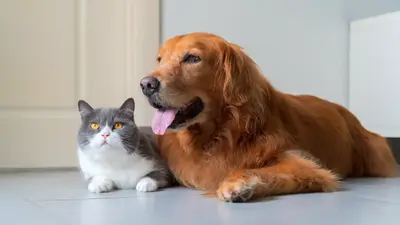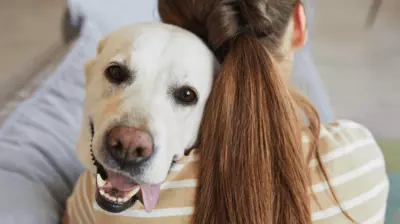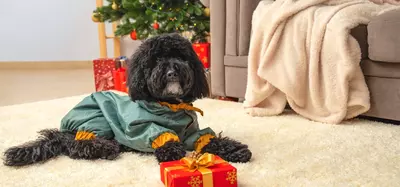Dogs and Fireworks: All You Need to Know
- 02 Nov 2023
- 6m read

As the Autumn season commences, we have lots to look forward to. It is a pawsitively magical and exciting time of year. Halloween, Bonfire Night, Diwali, Christmas, New Years Eve… all of these occasions present the perfect opportunity to set fireworks off.
As a pet parent, this can be a particularly stressful time. Whilst some dogs remain unbothered by the sound of fireworks, others can be genuinely traumatised by them. It can take up to 12 hours for the stress of fireworks to alleviate. Poor pups.
Thankfully, there are certain measures that you can take to help minimise the stress that your dog might be feeling during this time of year.
Why Are Dogs Scared of Fireworks?
Fireworks can be quite the spectacle for us, but for dogs, they are often a source of fear and anxiety. The loud, unpredictable noises and bright flashes can trigger negative responses in dogs. But why are dogs so scared of fireworks? There are a few key reasons:
Sensory overload
Dogs have incredibly sensitive hearing and can hear sounds at frequencies that humans can’t. Fireworks produce loud, high-pitched noises that can be overwhelming for them.
Unpredictability
Dogs thrive on routine and predictability. Fireworks are often unexpected, disrupting their sense of security and comfort.
Bright lights
The sudden bursts of colourful, bright lights can be disorienting and frightening for dogs.
Associative fear and past trauma
If a dog has had a negative experience with loud noises in the past, such as thunderstorms or fireworks, they may develop an ongoing fear. Be particularly mindful of this if you have a rescue pup.
Do Fireworks Hurt Dogs Ears?
Yes, fireworks can hurt dogs ears.
Dogs have sensitive ears, far more so than us humans. Fireworks produce deafening noise levels, which can be physically painful for our pooches. The intense sound can lead to temporary or even permanent damage to their delicate ears. In some cases, it can result in noise-induced hearing loss.
To help protect your dog's ears during fireworks displays, it's a good idea to keep them indoors where the noise is less intense. You might also consider using ear protection specifically designed for dogs, such as earmuffs or earplugs.
How to Prepare a Dog for Fireworks
Preparation is key when it comes to dogs and fireworks. This can be difficult if fireworks are being set off sporadically, but you should try to prepare as best as possible in advance of occasions such as Halloween, Bonfire Night, New Years Eve etc.
Practise desensitisation where possible
Gradually expose your dog to recorded firework sounds at a low volume and reward them for remaining calm. Over time, increase the volume. Associating the sound of fireworks with positive experiences, such as giving them treats or engaging in play, during the recorded firework sessions can also help to encourage resilience.
The Kennel Club has a great step-by-step guide for desensitisation, as well as their own Firework Pet Training playlist.
Go for an early walk
We would recommend taking your dog for an extra-long lunchtime walk and skipping out on their evening walk. As soon as it gets dark, the fireworks start. If your pup is tired, they’re also less-likely to be bothered by fireworks. If a long walk is not possible, other stimulating activities such as hide and seek, snuffle mats etc, will help to tire your dog out.
Create a safe space
Set up a quiet, comfortable area in your home where your dog can retreat to if they’re feeling anxious. This could be a cosy corner with their favourite bedding. If you use a crate, you can also cover the crate with a blanket to help block out noise and light. Be sure to keep checking in on them.
Give them toys and chews
Fireworks are the perfect opportunity to get the good treats out. The kind that you only save for special occasions when your pooch has been a really good boy or girl. Having their favourite toy alongside them will also help.
Ensure that their microchip details and ID tag are up to date
It is incredibly unlikely, but in the event that your dog may bolt during fireworks, it is essential that you ensure their microchip and ID tag details are correct so that they can be returned safely to you.
How to Block out Firework Noise and Light for Dogs
Here’s a couple of things you can do to drown out the sound and light from fireworks:
Close windows and curtains
Make sure that all of your windows, curtains and blinds are closed in advance of it getting dark. This will help to block out some of the sound and light.
Play music
Playing soothing music or white noise in your home can help to mask the sound of fireworks. We've even created our own Butternut Box Bonfire Night Spotify playlist, which you can use for any occasion. As well as comforting your dog, there's a chance it could become your new favourite playlist, too.
How to Calm Dogs During Fireworks
It can be really upsetting to see your dog trembling from fear of fireworks. Thankfully, there are a few things that you can do to help them calm down:
Make sure that you are also calm
Dogs are very intuitive and often pick up on their owner's emotions. If you remain calm and composed, your dog is more likely to feel at ease too.
Give them a cuddle
Many dogs find comfort in physical contact. Spending time cuddling or stroking your dog will help to provide reassurance.
Calming products
Consider using calming products like anxiety wraps or supplements, but be sure to check with your vet before using any of these products.
Should I Leave My Dog Alone During Fireworks?
Ideally, dogs should not be left alone when fireworks are being set off nearby. However, we know that sometimes this is out of a pet parent's control.
Increasingly so, it seems to be the case that celebrations for Bonfire Night start days earlier than anticipated, meaning that it is often hard to judge when fireworks will be being set off. Be sure to research firework displays near you to make sure that you’re aware of all of them.
If you’re going to have to leave your dog on their own while fireworks are being set off, there’s a few things that you can do to prepare them:
Set up their designated safe space with bedding, food, water, and familiar toys
Close windows, curtains and blinds to help block out noise and light
Plan regular check-ins, if you can’t do this, ask a family member, friend, neighbour…
Seek professional care from a pet sitter, this can take place in your home or theirs
Avoid locking them up as this can make them feel trapped and stressed
Can Vets Help with Fear of Fireworks?
Yes, vets can help with your dog’s fear of fireworks.
If your dog severely struggles from the impact of fireworks, they may provide medication to help calm them. However, this medication must only be prescribed and administered as per vet guidance.




